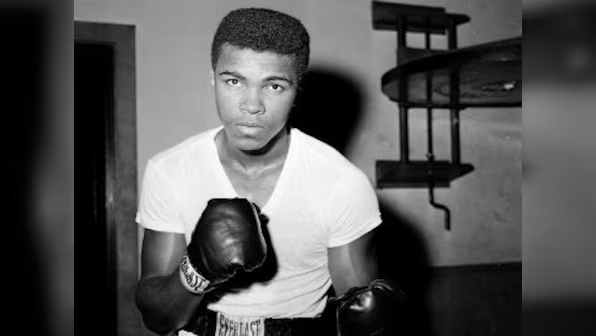kimzolciakwedding.com – Muhammad Ali, born Cassius Marcellus Clay Jr., is widely regarded as one of the greatest boxers in the history of the sport. Beyond his prowess in the ring, Ali was a cultural and social icon, known for his charisma, strong personality, and dedication to social justice causes. His influence extended far beyond the world of sports, as he became an advocate for civil rights, religious freedom, and humanitarian work. Ali’s impact on boxing and society continues to resonate today, solidifying his legacy as “The Greatest.”
Early Life and Introduction to Boxing
Birth and Family Background
Muhammad Ali was born on January 17, 1942, in Louisville, Kentucky, to Cassius Marcellus Clay Sr. and Odessa O’Grady Clay. Ali grew up in a segregated America, where racial discrimination was widespread, and African Americans faced significant challenges. His father worked as a sign painter, and his mother was a domestic worker. Ali’s family was supportive of his education and interests, and they encouraged him to pursue his passions.
At the age of 12, Ali’s life changed when his bicycle was stolen, prompting him to seek revenge on the thief. A local police officer, Joe Martin, overheard the young boy and suggested that he learn to box for self-defense. Ali began training at the local Columbia Gym under Martin’s guidance. It was clear early on that Ali had extraordinary talent and an eagerness to succeed.
Amateur Career and Rise to Prominence
Ali quickly gained recognition in the amateur boxing scene. He won a gold medal in the light heavyweight division at the 1960 Summer Olympics in Rome, marking the beginning of his rise to prominence. His victory in the Olympics helped to elevate him to national attention, and he was celebrated for his speed, agility, and unorthodox style in the ring.
By 1961, Ali turned professional and began to make a name for himself with his brash, confident personality and his unorthodox boxing style, which emphasized speed over power. He often boasted about his abilities, claiming, “I am the greatest,” a phrase that would become synonymous with his persona and legacy.
The Road to Becoming “The Greatest”
The Fight Against Sonny Liston
Ali’s rise to the top of the boxing world culminated in his first world title fight against Sonny Liston in 1964. Liston, a feared champion known for his brutal power, was widely expected to defeat the young challenger. However, Ali’s combination of speed, stamina, and ability to outthink his opponent led to a shocking victory in the seventh round when Liston’s corner threw in the towel.
Following the victory, Ali shocked the world by announcing that he had converted to Islam and changed his name to Muhammad Ali, rejecting his birth name of Cassius Clay. This decision was part of his embrace of the Nation of Islam, an African American religious movement that advocated for black empowerment and self-determination. Ali’s religious beliefs and public stance against racial injustice made him a controversial figure, but they also solidified his status as a leader in the African American community.
Defending the Title and Developing a Unique Persona
After defeating Liston, Ali went on to defend his title in a series of high-profile fights. His personality, which was a mix of bravado, humor, and confidence, captivated the public. Ali’s use of poetry and catchy phrases, such as “float like a butterfly, sting like a bee,” became legendary. He frequently taunted his opponents and built up hype for his fights, creating a spectacle that captivated both boxing fans and the general public.
One of his most famous rivalries was with the British boxer Henry Cooper, who nearly knocked him out in 1963. Despite the scare, Ali won the fight, and this incident contributed to the development of his legendary resilience and determination. Ali’s talent in the ring was matched only by his ability to generate excitement, which helped to popularize boxing in the 1960s.
The Fight of the Century: Ali vs. Joe Frazier
One of the most iconic rivalries in boxing history was between Muhammad Ali and Joe Frazier. Their first fight, known as the “Fight of the Century,” took place on March 8, 1971, in Madison Square Garden in New York City. Both Ali and Frazier were undefeated, and the fight became a spectacle that captured the imagination of the world.
The two fighters engaged in a brutal 15-round battle, with Frazier ultimately winning by unanimous decision. Despite the loss, Ali’s reputation remained intact, as he had proven his durability, heart, and resolve in one of the toughest fights of his career.
The Ali-Frazier rivalry would continue over the years, with the two fighters facing off in two more legendary bouts: the “Super Fight II” in 1974 and the “Thriller in Manila” in 1975. These fights were some of the most intense and brutal in boxing history, and they solidified Ali’s place as one of the greatest fighters of all time.
Political Stance and Personal Struggles
Refusal to Serve in the Vietnam War
Ali’s most significant stand outside the ring came in 1967 when he refused to serve in the Vietnam War. Ali, who had become a vocal critic of the war, cited his religious beliefs and opposition to the conflict as his reasons for refusing the draft. He famously stated, “I ain’t got no quarrel with them Viet Cong,” reflecting his position that African Americans should not be sent to fight in a war that had little to do with their struggles for civil rights.
His refusal to serve led to Ali being stripped of his boxing titles and banned from the sport. He was also convicted of draft evasion and sentenced to five years in prison, though he was later released on appeal. Ali’s stance made him a polarizing figure, with many people supporting his right to refuse military service, while others criticized him for his stance against the war.
Despite being banned from boxing for several years, Ali’s decision to stand up for his beliefs earned him the respect of millions of people around the world. His courage to risk his career and freedom for his convictions only enhanced his status as a champion, both in and out of the ring.
Return to Boxing and Regaining the Heavyweight Title
After a three-year hiatus, Ali returned to boxing in 1970. He eventually regained the heavyweight title in a historic fight against George Foreman in 1974. The “Rumble in the Jungle” took place in Kinshasa, Zaire (now the Democratic Republic of Congo), and was one of the most famous bouts in boxing history.
Ali was the underdog going into the fight, with Foreman known for his fearsome knockout power. However, Ali employed a strategy known as the “rope-a-dope,” where he allowed Foreman to tire himself out by leaning against the ropes and absorbing blows. In the eighth round, Ali delivered a stunning knockout, regaining the heavyweight title and solidifying his legacy as “The Greatest.”
The Thrill of Victory and the End of His Career
Ali’s final fight against Larry Holmes in 1980 marked the end of his illustrious career. At the age of 38, Ali was no longer the same fighter he had once been. His health began to deteriorate due to the toll boxing had taken on his body, and he retired from the sport for good. Despite his declining physical state, Ali’s impact on boxing remained unparalleled.
Legacy and Humanitarian Work
Humanitarian Efforts and Advocacy
In his later years, Muhammad Ali became a global ambassador for peace and humanitarian causes. He traveled the world, meeting with world leaders, advocating for religious freedom, and speaking out against injustice. Ali was involved in several charitable initiatives, including supporting children’s hospitals, promoting racial equality, and working on behalf of individuals with Parkinson’s disease, a condition that Ali was diagnosed with in 1984.
Ali’s work as a humanitarian earned him numerous awards, including the Presidential Medal of Freedom in 2016, which was awarded to him posthumously. His legacy as a champion for civil rights and social justice continues to inspire people around the world.
Impact on Boxing and Popular Culture
Ali’s influence extended far beyond boxing. His charisma and ability to connect with people helped elevate the sport to new heights of popularity. He became a pop culture icon, with his distinctive style, confidence, and activism making him one of the most recognizable figures in the world. Ali transcended sports, becoming a symbol of resistance, empowerment, and perseverance.
His famous catchphrases, poetry, and charismatic personality made him a favorite of the media and fans alike. Ali’s willingness to speak his mind, challenge authority, and stand up for his beliefs set him apart from other athletes, and he remains one of the most influential sports figures in history.
Conclusion
Muhammad Ali’s legacy as “The Greatest” extends far beyond his accomplishments in the boxing ring. He was a champion for civil rights, a social icon, and a voice for the marginalized. Ali’s courage in the face of adversity, his ability to entertain and inspire, and his commitment to his beliefs made him one of the most beloved and influential athletes in history. Today, his impact can still be felt in boxing, sports, and society as a whole. Ali’s story is a testament to the power of belief, resilience, and the enduring fight for justice.



